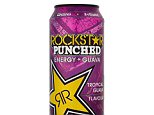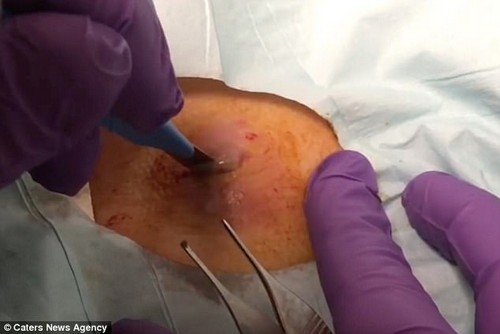The brand’s Super Sours Energy Drink Bubbleburst and Xdurance Performance Energy Blueberry, Pomegranate and Acai Flavour each have 70g, or 17 teaspoons, per 500ml.
Energy drinks should be banned for children under the age of 16 due to their high sugar levels, campaigners have said.
The worst offending drink is the Punched Energy and Tropical Guava Flavour product from Rockstar, which contains a staggering 78g, or 20 teaspoons, of sugar per 500ml serving – more than three times the daily recommendation of 25g for women and 38g for men.
Caffeine and calorie content also remain at concerning high levels despite the impending ‘soft drinks tax’ next year. The study also analysed the ingredients of products measuring between 150 and 1,000ml, however, 500ml is the standard on-the-go drink bottle size.
Co-author of the study, Professor Graham MacGregor, of Queen Mary University of London and chairman of Action on Sugar, said: ‘They are completely inappropriate for children to consume, form no part of a healthy balanced diet, and should be banned for under 16s.’

Rockstar products were discovered to be the worst offenders with their Punched Energy and Tropical Guava Flavour product containing a staggering 78g per 500ml serving
Rockstar Xdurance Performance Energy Blueberry, Pomegranate and Acai Flavour has 70g
Rockstar’s Super Sours Energy Drink Bubbleburst also has 70g, or 17 teaspoons, of sugar
The different branded Relentless Energy Drink Passion Punch also contains 70g of sugar
WHAT FIVE 500ML DRINKS DID THE STUDY FIND CONTAIN THE MOST SUGAR?
Grams of sugar:
Rockstar Punched Energy + Guava Tropical Guava Flavour
Rockstar Juiced Energy + Juice Mango Orange Passion Fruit Flavour
Rockstar Super Sours Energy Drink Bubbleburst
Rockstar Xdurance Performance Energy Blueberry, Pomegranate and Acai Flavour
Relentless Energy Drink Passion Punch
78
75
70
70
70
PRESSURE FROM PEERS AND EVEN PARENTS IS DRIVING UP TO ONE-IN-THREE 10-YEAR-OLDS TO CONSUME ‘POISONOUS’ ENERGY DRINKS
Scientists revealed for the first time earlier this month why up to one-in-three 10-year-olds consume energy drinks, which are sold for as little as 25p a can.
Peer pressure is a key driver behind young people’s consumption of such beverages with one 10-to-11 year old girl commenting, ‘Say your friend has an energy drink…you’re tempted to get that because it looks cooler and what your friends have you want.’
Parents even coerce their children into having energy drinks in exchange for good behaviour with one boy saying: ‘Sometimes dad says to me, “Go down the shop and get us some washing-up liquid. There’s a can of Red Bull in there with your name on it.”‘
Study author Dr Amelia Lake, previously at Newcastle University, told MailOnline: ‘We want a call on manufacturers to be more responsible with clearer labelling and restrictions on marketing.’
Energy drinks, which have previously been linked to headaches, abdominal pain and insomnia, can contain around 160mg of caffeine, despite 105mg being the safe daily limit for 11 year olds.
Professor Steven Lipshultz, pediatric cardiologist at the Children’s Hospital of Michigan in Detroit previously said a 10-year-old could get caffeine poisoning after consuming 80mg of caffeine, while a 12-year-old may suffer symptoms, including hallucinations and convulsions, after 100mg.
Sales of the energy drinks in the UK increased by 185 per cent between 2006 and 2015, making the market worth more than £2 billion.
Some 68 per cent of consumers are between 10 and 18 years old, who drink on average 3.1 litres of such beverages every month.
‘Should be banned for under 16s’
Action on Sugar is now calling for a complete ban on the products for under 16s.
Its study found energy drinks are typically larger than other fizzy drinks, at an excessive 500 ml – twice the standard serving.
Furthermore, the average sugar content was more than an adult’s entire maximum daily recommendation for sugar intake in the UK.
Likewise, 78 percent of products this year exceeded the maximum daily recommendation for sugar intake for a child aged seven to ten 10 years – 24 g or six teaspoons.
Co-author of the study, Professor Graham MacGregor, of Queen Mary University of London and chairman of Action on Sugar, said: ‘This study illustrates the huge contribution of energy drinks to sugar intake, which is linked to the development of obesity and various types of cancer, as well as type 2 diabetes and rotting our children’s teeth.
‘They are completely inappropriate for children to consume, form no part of a healthy balanced diet, and should be banned for under 16s.’
‘Action must be taken now’
Other products laden with sugar included Relentless Energy Drink Passion Punch, with 70g per 500ml serving.
The study, published in BMJ Open, reveals the sugar, calorie and caffeine content of energy drinks for the first time.
It showed a 10 per cent reduction in sugar from 10.6g to 9.5g/100 ml and a six per cent reduction in calorie content per 100 ml between 2015 and 2017 highlighting that certain manufacturers have started to reformulate before the Soft Drinks Industry Levy in April.
Soft drinks are the main contributor of sugar intake in children (4-10 years) and teenagers (11-18 years) as well as the second main contributor in adults (18-64 years), contributing to a staggering 30%, 40% and 25% of sugar intake, respectively.
UK has the highest energy drink consumption in Europe
Youngsters in the UK are among the highest consumers of energy drinks in Europe.
The researchers said to reduce the amount of sugar, calorie and caffeine consumed from energy drinks, larger serving sizes (500 ml bottles and cans) should be restricted, while warning labels for caffeine should be kept.
But to reduce the harmful impact of energy drinks, further reductions in sugar, calorie and caffeine are urgently needed, they said.
Other measures such as a ban on the sale of energy drinks to children, which was previously called for by Action on Sugar and is now backed by Jamie Oliver and school teachers, should also be implemented.
Co author Kawther Hashem, a nutritionist at Action on Sugar, added: ‘Whilst it is encouraging to see some energy drinks manufacturers have reduced sugar in advance of the levy next spring, the huge can and bottle sizes (500ml) means youngsters are still consuming far too much unnecessary sugar and caffeine.
‘It is clear further reductions in both sugar and caffeine are urgently needed, and they should get rid of large serving sizes – action must be taken now without further delay.’
Rockstar and Relentless have been approached for comment.
THE SUGAR CONTENT OF ALL THE 500ML ENERGY DRINKS IN THE STUDY
Grams of sugar compared to the recommended 25g for women and 38g for men:
Rockstar Punched Energy + Guava Tropical Guava Flavour
Rockstar Juiced Energy + Juice Mango Orange Passion Fruit Flavour
Rockstar Super Sours Energy Drink Bubbleburst
Rockstar Xdurance Performance Energy Blueberry, Pomegranate and Acai Flavour
Relentless Energy Drink Passion Punch
Lucozade Energy Orange
Lidl Freeway Up Colossus Energy Drink
Lucozade Energy The Brazilian Mango Mandarin
Relentless Lemon Ice Energy Drink
Rockstar Energy Drink
Bulldog Power Energy Drink
Monster Energy Assault
Relentless Origin Energy Drink
Relentless Energy Drink Apple Kiwi
Monster Energy
Boost Energy Original
KX Energy Stimulation Drink
Monster Energy The Doctor
Emerge Energy Drink Original
Monster Punch Energy
Monster Ripper Energy + Juice
Monster Juiced Energy + Juice
Monster Khaos Energy + Juice
Relentless Energy Drink Cherry
Lucozade Energy Pink Lemonade
Lucozade Energy Caribbean Crush
Lucozade Energy Tropical Fusion Pineapple & Kiwi Flavour
Monster Rehab Tea + Still Lemonade + Energy




